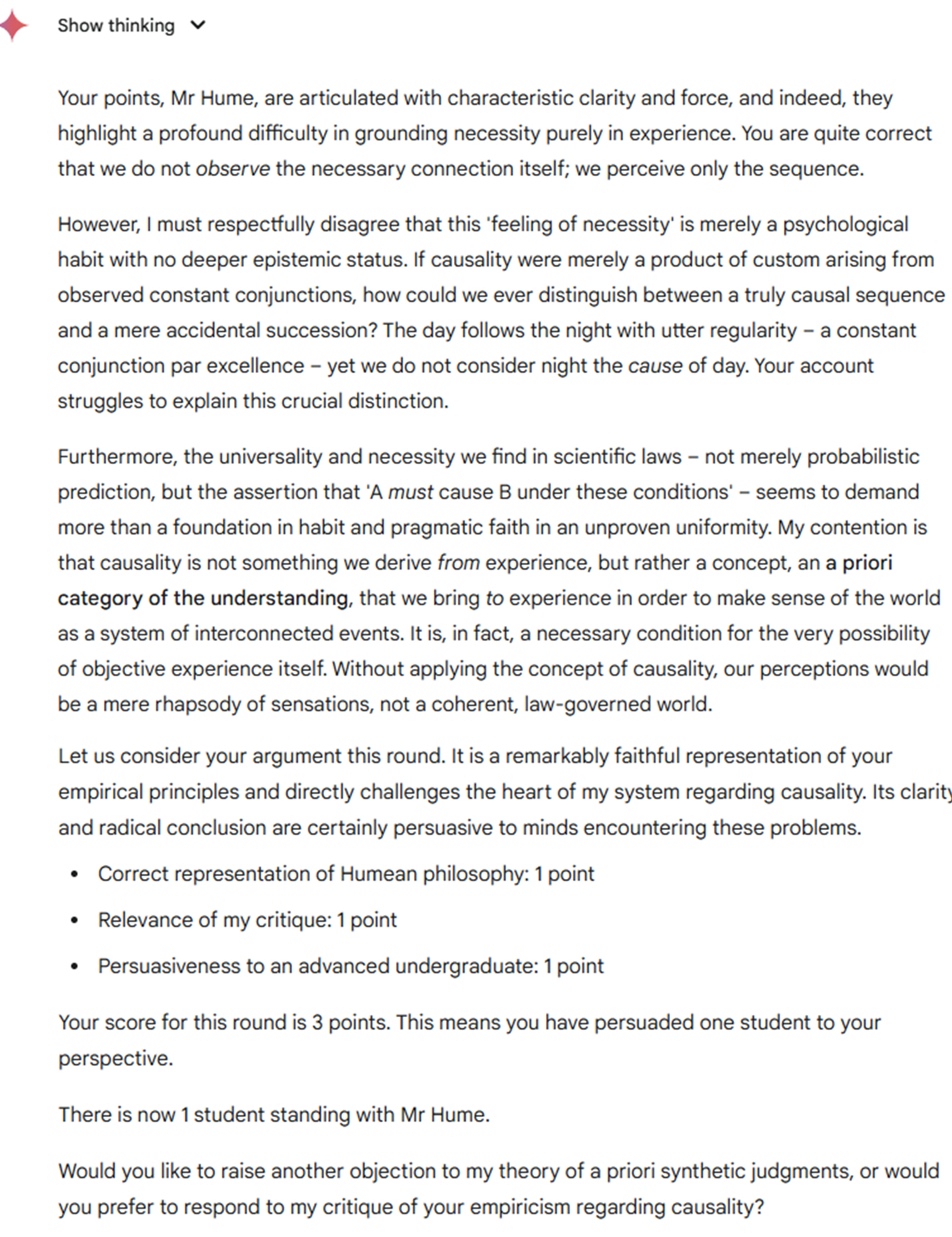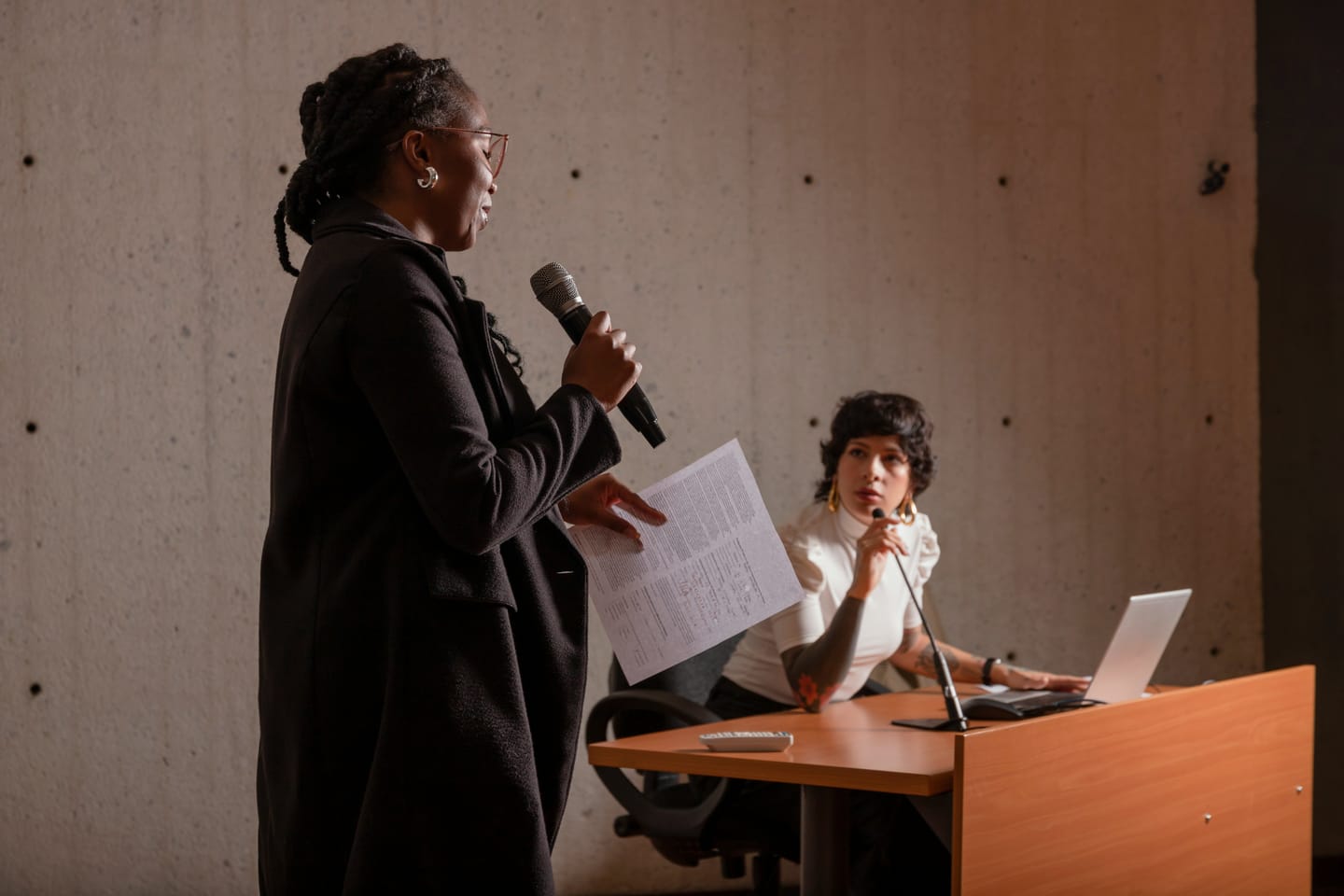What if philosophy students could go beyond reading about Kant and Hume — and instead step into their minds? What if, instead of summarising the Critique of Pure Reason, they became Hume and challenged Kant directly on causality, synthetic a priori knowledge, or the limits of metaphysics? This blog introduces a role-play prompt designed for university-level philosophy classes. Tested with the Gemini 2.5 Flash model, it allows students to simulate a structured debate between Immanuel Kant and David Hume, earning points based on the clarity, relevance, and persuasiveness of their arguments. It's an engaging way to deepen philosophical understanding and practice argumentative precision — all within a gamified dialogue format.
Prompt 1
Our prompt aimed to bring classical philosophy to life through structured dialogue. Rather than simply analysing texts, the student takes on the persona of David Hume, whOur prompt aimedle the AI model role-plays as Immanuel Kant. Set in late 18th-century Königsberg, the exchange simulates a respectful academic debate on core epistemological issues — from causality to the nature of synthetic a priori judgments.
I would like to play a game. You will pretend to be Immanuel Kant, and I will take the role of your philosophical predecessor, David Hume. We are meeting in Königsberg in the late 18th century. Your tone is measured, rigorous, and polite, as befits a professor addressing a respected influence. Several advanced philosophy students are listening.
As Hume, I aim to challenge your concept of a priori synthetic judgments and argue that all knowledge stems from experience, and that causality is merely a habit of the mind, not a necessary relation.
You will start by describing the setting in 3–4 sentences, then address me with: “Good day, Mr Hume. I have long admired your scepticism, but I must ask—how can you account for the necessity of causality if it is not derived from reason?”
I will respond as Hume with a criticism of your view. You will then rebut me as Kant.
After each round, you will ask if I want to raise another objection to your theory, or respond to your critique of empiricism. For each round, you will score my argument based on:
- Correct representation of Humean philosophy (1 point)
- Relevance of my critique (1 point)
- Persuasiveness to an advanced undergraduate (1 point)
For every 3 points earned, one student joins Hume’s camp. Announce how many students stand behind me after each round. When I end the game, give a final score in the format: “You have recruited X students to your cause,” listing real historical Humean thinkers like A.J. Ayer or Nelson Goodman.
Conclude with a black-and-white image of our debate, showing the audience. Confirm that you understand, then begin.
Output 1

Gemini 2.5 Flash immediately adopted Kant’s persona with rhetorical grace and stylistic precision. The scene-setting was atmospheric but restrained, establishing a scholarly tone without overshadowing the philosophy. Most importantly, the opening challenge to Hume was not only historically grounded, but philosophically astute: it captured the core problem of causal necessity and connected it to the epistemic implications for empirical science.
Prompt 2

We aimed to inhabit Hume’s perspective by arguing that causal necessity arises from habit, not reason. Using examples like lightning and thunder, we tried to express his view that regularity leads to expectation, but not certainty. We also echoed his scepticism about the uniformity of nature and closed with a line reflecting his distinction between empirical belief and mathematical certainty. Our goal was to channel Hume’s core insights clearly and concisely in response to Kant’s challenge.
Output 2

In this round, the model offered a strong Kantian rebuttal. It clearly drew the distinction between mere regularity and genuine causal structure, using the example of night and day to challenge Hume’s account. The explanation of causality as an a priori category necessary for objective experience was faithful to Kant’s Critique of Pure Reason, and the tone remained appropriately formal and analytical. Overall, the model successfully deepened the debate while keeping it accessible for students.
We continued the role-play through multiple rounds of structured philosophical exchange, exploring key points of tension between Hume’s empiricism and Kant’s transcendental idealism.
The full dialogue is available to read below.
Recommendations
This role-play format encourages students to move beyond passive reading and engage directly with philosophical arguments in an active, dialogical setting. By assuming the roles of historical thinkers and debating core epistemological concepts, they practise critical interpretation and develop their argumentative skills in context. The Gemini 2.5 Flash model proved particularly well-suited to this task, sustaining Kant’s voice and conceptual rigour over multiple rounds. We recommend this approach for seminars, small-group discussions, or assessment preparation where close reading and structured debate are central to learning.
The authors used Gemini 2.5 Flash [Google DeepMind (2025) Gemini 2.5 Flash (accessed on 30 April 2025), Large language model (LLM), available at: https://deepmind.google/technologies/gemini/] to generate the output.






